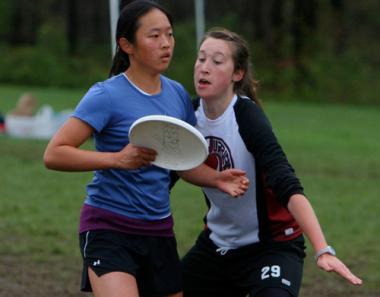This weekend, high school Ultimate teams from across the Northeast will converge on the Valley for the 19th Annual Amherst Invitational Tournament.
The game—the object of which is to score points by tossing a flying disc to a team member in the opponent’s end zone—is believed to have originated in Amherst in 1968. This is the oldest such tournament of its kind. When it began, there were only seven high school teams competing; this year organizers sorted through 40 applications to select the 25 teams that will compete in two boys divisions and one for girls.
“Jim Pistrang, Josh Nugent and I reviewed the teams applying, and made our selection based both on who was the most competitive—which teams have been around the longest and have the strongest teams—but also which teams were doing the most to promote the sport,” Tiina Booth said in a telephone interview with the Valley Advocate. She is the coach for Amherst’s boys varsity team, and also co-author of Essential Ultimate: Teaching, Coaching, Playing. Pistrang, who is one of the tournament’s founders, coaches the middle school team, and Nugent coaches the girls varsity team.
As well as teams from Amherst, Northampton and Longmeadow High Schools are among those that will be competing this weekend.
Given the relative newness of the game, Booth explained, promoting it and attracting players has been critical to its success. “Basketball or baseball teams don’t have to explain what they’re all about to get people to play,” she said. “Outreach has been important in gaining acceptance for Ultimate.” When Booth began coaching in 1992, there were only a handful of teams in the state, but now she believes there are “somewhere between 60 and 70” in Massachusetts alone.
Game historians credit Jared Kass, then a student at Amherst College, with teaching the game to kids while he worked as a summer camp councilor at Northfield Mount Hermon. One of the campers was Joel Silver—future producer of such movie franchises as Die Hard, Lethal Weapon and The Matrix—who was then a student at Columbia High School in Maplewood, N.J. After the summer, he began the first high school team and, together with his fellow players, made the first attempt to codify formal rules, and they first dubbed the game Ultimate Frisbee. (“Frisbee” has since been dropped from the name, as it’s a trademark of the Wham-O toy company, and discs by other makers are currently preferred for competitive play.)
Despite being organized into leagues and played at tournaments internationally, the game still has the reputation as something that happens spontaneously where and whenever hippies congregate. In addition to its counterculture roots, this perception is probably perpetuated by its colorful lingo (such as: handlers, cutters, hucks, popper d, puke, deep-deep, chrome wall, etc.), and because the game is also distinguished by its lack of referees. It is a self-officiated game, and all players are expected to adhere to what has become known as “the Spirit of the Game” where mutual respect, the joy of play, and adherence to the rules are held in higher regard than victory at all costs.
“Self-refereeing is a hot-button issue,” Tiina Booth said when asked about this aspect of the game. While some of her colleagues see it as critical to the character of the game, she’s not so certain. She pointed out that even though the original rules for the game defined a foul as “any action sufficient to arouse the ire of your opponent,” the same rules also permitted officials to oversee the game. The lack of referees was the result of necessity, she said, rather than choice. “Because the game is so new, until now it hasn’t reached the critical mass where there were enough people familiar enough with the game to act as referees.”
Rather than being a feature that distinguishes the game, she said, the lack of referees “makes some people see the game as illegitimate.
“Self-regulation doesn’t work in competition,” she said, citing recent tournaments where she witnessed her team being fouled and was frustrated there was no immediate recourse.
Still, she recognizes and takes pride in the Ultimate community being different, and notes that tournaments are not like typical athletic competitions. “They have that quality of being a festival or celebration,” she said, and she pointed out that the families of players will provide room and board for the hundreds of players coming to Amherst this weekend. “We just got back from a tournament in Atlanta, and our players all stayed with families down there. We were there for four nights and they opened their homes to us.”
She expects similar treatment when she takes her team to Buffalo later next month.
To see firsthand what Ultimate is all about, the public is welcome and encouraged to attend matches on Saturday and Sunday (May 1 and 2) to watch the competition unfold on the Amherst high school and middle school athletic fields.



